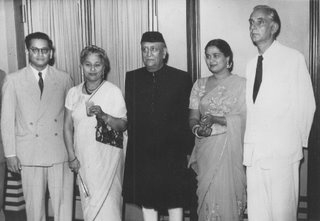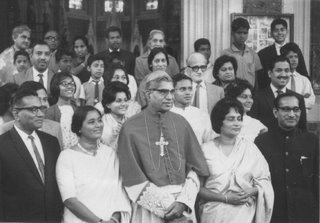Journal Jottings
McCartney in Gir?

Photo: HINDU Young World: Sushanta Patronobish
Is he fashionably vegetarian, or playful, or frustrated, this Gir lion, presently in a zoo?
Tree and Leaf
My Brother-in-Law, Gentil e Nobre
My first meeting with Jimmy was when I came to Bombay with my father, for my formal engagement, at the end of January 1950.
I knew that all the arrangements for our accommodation in a hotel near Asian Building had been made by Jimmy, but he was still just a name to me. When our train halted at the V.T., we planned to hire a taxi. Suddenly we noticed a gentleman and a lady who appeared to be looking out for a passenger they had come to meet. As they looked attentively at each passenger, we alighted, coming face to face with them. Jimmy said: “Here we are. Dr Alvares?” and my father replied: "Sim". Then Jimmy introduced himself and his wife, Irene. The name ‘Jimmy’ was informal and affectionate, and that is how he was known in official circles as well as to his friends.
I knew that all the arrangements for our accommodation in a hotel near Asian Building had been made by Jimmy, but he was still just a name to me. When our train halted at the V.T., we planned to hire a taxi. Suddenly we noticed a gentleman and a lady who appeared to be looking out for a passenger they had come to meet. As they looked attentively at each passenger, we alighted, coming face to face with them. Jimmy said: “Here we are. Dr Alvares?” and my father replied: "Sim". Then Jimmy introduced himself and his wife, Irene. The name ‘Jimmy’ was informal and affectionate, and that is how he was known in official circles as well as to his friends.
It is a common belief that first impressions are long-lasting and powerful. So it was with this one. I thought Jimmy and Irene a very amiable couple, affable and considerate; Jimmy had seen to all that long-distance travellers might require. After settling us into our hotel room, they left, with Jimmy assuring us that he would return to take us to his home for lunch, when we would meet other members of the Heredia family.
Mine was an arranged marriage and, naturally, I was apprehensive at every stage. I observed and assessed every family member introduced to me, and I was even more favourably impressed with Jimmy and Irene. The engagement ceremony took place at Asian Building, presided over by Cardinal Valerian Gracias, a friend of all the family but especially of Jimmy and Irene. After that there was a sumptuous dinner, for the family and a few close friends. I noticed Jimmy’s special affection for Fred, and in due course I had proof that this was not my fancy or imagination. Later on, it was Jimmy who made all the arrangements for the wedding, and gave a very grand dinner for us, including Fred’s guests who had come from the district where he was posted.
I soon learned that Jimmy, as head of the family after his father’s death, had cared as attentively and affectionately as a father for his younger brother and sisters. All of us had the benefit of his understanding of financial matters, and of his wise investments. I noted silently, but gratefully, the many times he assisted Fred unasked, and the interest he took to promote Fred’s career.
Over the years I came to know of so many other good qualities in Jimmy that are well-known to others, and which I don’t need to write about. My first favourable impression of Jimmy was confirmed many, many times and enlarged. But to my mind the best thing any one ever said about Jimmy was the remark of my great and dear friend Clara:
“Senhor Jimmy e muito differente, a ‘gentleman’, gentil e nobre.”
Mine was an arranged marriage and, naturally, I was apprehensive at every stage. I observed and assessed every family member introduced to me, and I was even more favourably impressed with Jimmy and Irene. The engagement ceremony took place at Asian Building, presided over by Cardinal Valerian Gracias, a friend of all the family but especially of Jimmy and Irene. After that there was a sumptuous dinner, for the family and a few close friends. I noticed Jimmy’s special affection for Fred, and in due course I had proof that this was not my fancy or imagination. Later on, it was Jimmy who made all the arrangements for the wedding, and gave a very grand dinner for us, including Fred’s guests who had come from the district where he was posted.
I soon learned that Jimmy, as head of the family after his father’s death, had cared as attentively and affectionately as a father for his younger brother and sisters. All of us had the benefit of his understanding of financial matters, and of his wise investments. I noted silently, but gratefully, the many times he assisted Fred unasked, and the interest he took to promote Fred’s career.
Over the years I came to know of so many other good qualities in Jimmy that are well-known to others, and which I don’t need to write about. My first favourable impression of Jimmy was confirmed many, many times and enlarged. But to my mind the best thing any one ever said about Jimmy was the remark of my great and dear friend Clara:
“Senhor Jimmy e muito differente, a ‘gentleman’, gentil e nobre.”
Remembering Uncle Jimmy
The two characteristics of Uncle Jimmy that I chiefly remember when I think of him are his love of laughter, and his helpfulness.
When I was little I learned one verse of a Gujarati folk-song that was generally danced to - perhaps a garba - and in the solemn way that small children have, I must have demonstrated this minor accomplishment to Uncle Jimmy. Years and years after that, his first greeting to me was invariably “Khem cho Chakliben?” with a broad grin. He was never unkind in his humorous replies or remarks - not that I ever heard - but he had a well-developed sense of the ridiculous, and frequently found some comical aspect to things said in his hearing.
I still have a yellowed thesaurus which long ago yielded in usefulness to a better organized volume. Yet it keeps its place with my other reference books and for one reason: its inscription. On the fly-leaf is the date, 7 August 1967, and the words: “to dearest Ruth, from an admiring Uncle”. I never knew why Uncle Jimmy sent me the book, and so inscribed - I was too shy to ask lest it seemed like fishing for another compliment, and that inscription made me quite sufficiently proud!
This circumstance must have been in my mind when I appealed to him for assistance in obtaining a much-desired book. In December 1968 I had made the acquaintance of Tolkien in the classic bound volumes of Allen & Unwin, and my dearest wish was to have my own copy of The Lord of the Rings always to hand. Ahmedabad’s bookshops were too rustic then for Tolkien, but even Higginbotham’s and International Book House of Bangalore had offered Mummy books on Good Habits in the belief that that was what she meant by a book about hobbits. So I asked Uncle Jimmy. He must have got the books from Strand Bookshop, and I received - oh glorious gift! - an entire set of Tolkien in the now notorious Ballantine edition with the bizarre covers. Four of those five books were read almost to pieces before being replaced by a revised edition. But the gift was recorded in my Tolkien scrapbook as “received from Uncle Jimmy on 6 April 1970”, and there remains the fifth book, A Tolkien Reader.
So you see, Uncle Jimmy is always around somehow, and always a benevolent presence…
When I was little I learned one verse of a Gujarati folk-song that was generally danced to - perhaps a garba - and in the solemn way that small children have, I must have demonstrated this minor accomplishment to Uncle Jimmy. Years and years after that, his first greeting to me was invariably “Khem cho Chakliben?” with a broad grin. He was never unkind in his humorous replies or remarks - not that I ever heard - but he had a well-developed sense of the ridiculous, and frequently found some comical aspect to things said in his hearing.
I still have a yellowed thesaurus which long ago yielded in usefulness to a better organized volume. Yet it keeps its place with my other reference books and for one reason: its inscription. On the fly-leaf is the date, 7 August 1967, and the words: “to dearest Ruth, from an admiring Uncle”. I never knew why Uncle Jimmy sent me the book, and so inscribed - I was too shy to ask lest it seemed like fishing for another compliment, and that inscription made me quite sufficiently proud!
This circumstance must have been in my mind when I appealed to him for assistance in obtaining a much-desired book. In December 1968 I had made the acquaintance of Tolkien in the classic bound volumes of Allen & Unwin, and my dearest wish was to have my own copy of The Lord of the Rings always to hand. Ahmedabad’s bookshops were too rustic then for Tolkien, but even Higginbotham’s and International Book House of Bangalore had offered Mummy books on Good Habits in the belief that that was what she meant by a book about hobbits. So I asked Uncle Jimmy. He must have got the books from Strand Bookshop, and I received - oh glorious gift! - an entire set of Tolkien in the now notorious Ballantine edition with the bizarre covers. Four of those five books were read almost to pieces before being replaced by a revised edition. But the gift was recorded in my Tolkien scrapbook as “received from Uncle Jimmy on 6 April 1970”, and there remains the fifth book, A Tolkien Reader.
So you see, Uncle Jimmy is always around somehow, and always a benevolent presence…
And here are two photographs in which you can see Uncle Jimmy, both times on the extreme left. James Nathaniel Heredia; ‘J. N. Heredia’ of the road in Ballard Estate, Bombay; “Jimmy” to all in the world who knew him, was a person affectionate, kind, dependable, and much more. Something of this you may see in his smile.


scribendi cacoethes

MEMORY
Sunbright blossom
blazing in the heat of high summer:
black branch, green leaf,
and every flower impearled.
Dusty path, brown burnt hedges,
and a shimmering road;
high white walls sun dazzle,
hot blue-glass sky weighs down,
and nothing moves that can be still;
only that blossom –
glancing over the wall.
Sunbright blossom
blazing in the heat of high summer:
black branch, green leaf,
and every flower impearled.
Dusty path, brown burnt hedges,
and a shimmering road;
high white walls sun dazzle,
hot blue-glass sky weighs down,
and nothing moves that can be still;
only that blossom –
glancing over the wall.

Stooping swiftly out of the heavens
a bird’s call:
so clear, so sweet,
it stopped the turning of the spheres,
and beauty seized me by the throat
so that I knew this,
- here – and now – this
was the moment –
Verweile doch! Du bist so schon!
But all things pass, even such a moment
of beauty that is earthfound.
Somewhere a dog barked, children shrilled at play,
and all the sounds and smells
of life at mid-morning in summer
returned.
I live yet,
and so, most strangely bright,
does that moment out of time;
held forever in my soul,
alive – but very still.
©1972 by Ruth Heredia
Ruth Heredia is the originator and
holds the copyright to all material on this blog unless credited to some
source. Please do not use it or pass it off as your own work. That is theft. If
you wish to link it, quote it, or reprint in whole or in part, please be
courteous enough to seek my permission.




